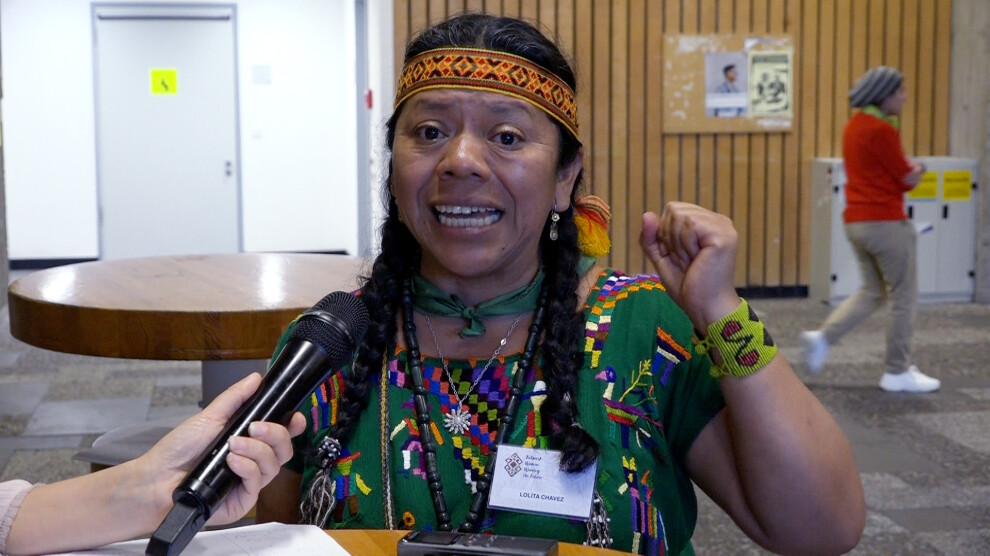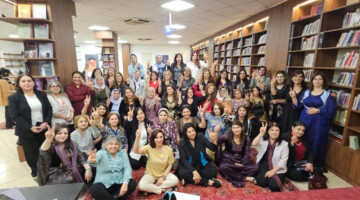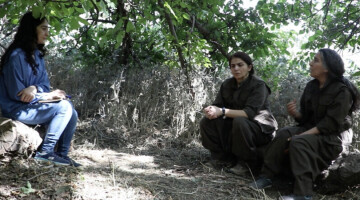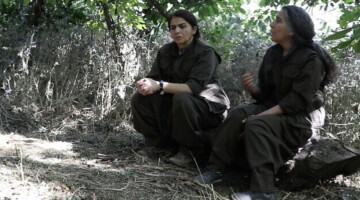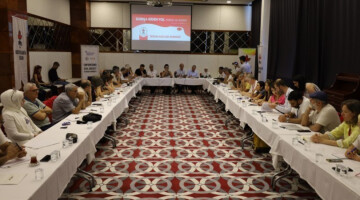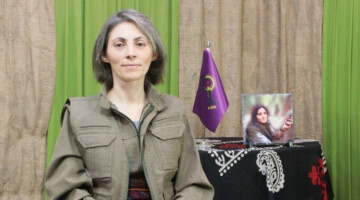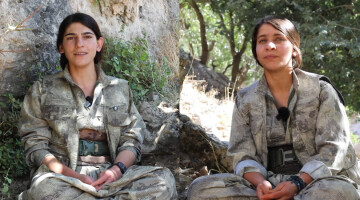Aura Lolita Chávez Ixcaquic is a member of the Consejo de Pueblos Kiche (CPK), a movement of peoples and communities against patriarchy, imperialism, colonialism, neoliberalism, extractivism, established in 2007 to combat the effects of the Free Trade Agreement (FTAA) between Central America and the USA.
She is an international leader in the struggle to protect natural resources and has been living in the Basque country for 5 years as her country is threatened with death.
Community, life, mother nature, soil, protection of the soil, these concepts and your colourful clothing evoke matriarchal life. Where are the K'iche peoples in this life? And what kind of threats do they face?
Well, we are a millenary expression. We have our own accounting of the calendar, the Mayan calendar. We have a social fabric that we have taken care of for more than 5000 years. It is the social fabric of the Mayan K’iche cosmovision. We are a communal being in the territory and we take care of this territory, we take care of the mother earth as we take care of ourselves, because we are earth, we are water, we are air and fire. This is the sacred bond and it is because of it that we are anti-imperialist, anti-patriarchal and anti-extractivist. We defend life and earth with our lives.
You have been criminalised, threatened with death, even attacked and forced into exile for defending the land of the K'iche people against the exploitation of state-sponsored companies. After this process, did you think of retreating into a corner?
The state of Guatemala is a racist state. I have been attacked, prosecuted. The state has said, through police and army reports, that I am a terrorist. I am not a terrorist, we defend the territory.
When I went into exile, they thought they were going to silence me because they had created a lot of fear by trying to assassinate me six times at gunpoint, but I managed to get out and continue.
What gives you strength? In what ways have you made your voice heard by your people?
What gives me strength outside? That I link up with movements. This is why I embrace the Kurdish women's movement, because through their popular education with Jineolojî they give us that strength, the strength that we are not alone. In other territories there is a struggle, there is a lot of strength against these companies of death. Many of the companies are European and I came to Europe to denounce their companies in their place of origin. From here they leave to invade there.
They also use weapons, that is why we denounce wars. My people suffered genocide, they tried to exterminate my people, the K'iche people. There were bombings, they razed lands, there were disappearances and systematic rapes. We have denounced all this. The strength of my people gives me strength, because my people continue to fight. Even though I am gone, the people continue.
What is the method of struggling against a system that does not recognise the existence of peoples and impoverishes them?
We were able to carry out an autonomous process of free self-determination, in a very assembly-based manner. Assemblies work with children, women, elderly people, etc. So I know that I am not alone, that my people are still fighting, but other territories are fighting too.
We know that we are going to liberate our territories. It is our commitment to liberate our territories from those companies that kill biodiversity. We are not alone, there are the plants, the trees, the mountains. There is the biodiversity that surrounds us as well. The energy of the jaguars, the energy of the snakes, the energy of the waters, help us and we help them too. We are not alone.
One of our paths is the Ütz'ilaj Kaslemal, the Buen Vivir (Good Living), an alternative to false development. This path is in the network of life, we respect nature and take from nature only what we need. No accumulation, no extractivism, but a return to the land. It is to sow, to sow our food. Also medicinal plants. Biodiversity and the mountains give healing. This is also a path; health as an autonomous process in the territories. So, in short, there is “the good living”, “the territory with health”, “the food for life” or so-called food sovereignty, and “the fight against violence”. We say that if we free our body-territory from violence, we free the land-territory from violence as well. And this is community work, not only for women or gender-dissidents, but also for men and the community. We need to unite to fight against violence.
What are your alternative system struggle and practices so that indigenous peoples can get rid of this system of oppression?
We tell the feminist movement, ecologist movement, movements against climate change and global warming: Many of the companies that are most influencing climate change and global warming are in Europe. From Europe they go to our territories to attack us. That is why we ask these movements to carry out actions and mobilizations against those companies, here in Europe.
In my country there are companies from Spain, France, Italy, Germany,… The “World Bank” is also involved. The mono-culture tree project is being financed by the “World Bank”. We want the “World Bank” to be denounced here in Europe and that companies be sanctioned. If companies are sanctioned here in Europe, we will be able to live there. Their hands are stained with blood while we are giving our lives in our territories. If humanity is fighting against global warming, they cannot allow them to continue exterminating us who care for nature. We continue to fight, but here they have to stop their companies, and this can be done by the feminist movements.
By the way, you also have a call to revolutionise feminism and you call yourself social feminists. Are you saying that feminist movements have a problem of socialisation?
Feminisms must be plural and diverse, there is not one feminism, there are many feminisms. The feminism that I embody is community feminism, from below, from the grassroots, expressed from the marginalized movements that suffer from oppression. It is from there that feminisms arise, which must be not only anti-patriarchal but also anti-racist, anti-colonial and anti-neoliberal.
It is important to tell the world that it is necessary to weave departriarchalization and decolonization. This is not only for Abya Yala (which we do not call America, we call Abya Yala), but in this way, Europe can also liberate its territory and the same for other continents. We can weave feminisms and these feminisms can liberate territories on different continents. More feminism is more liberation of life.
We have a very strong critique of elite feminisms, supremacist feminisms. It is not good because they generate power relations over us and "tutelage" us, they speak for us. We do not want them to speak for us, we can speak and say what we want and what we feel. Our agendas are ours. The “intelligentsia” gets into feminism and creates absolute truths, concepts, approaches, themes... We say that feminism must come out of the movement. The “intellectuals” and the academy sometimes do a lot of damage by excluding them.
Feminisms are not desk-based, they are not book-based, they have to come down to earth and respect what we are generating in the territories, they have to know us.
There are the white feminisms. They are not white just because of their skin, but because they think that white people are supreme, they are better. And in the face of this, we say that plural and diverse bodies must be woven in equality, not between intellectuals who think they are better and we who are treated as witnesses. We are wise. These white feminisms must turn to look and learn from our expressions. They must also weave from below. It cannot be that they are capitalists and neoliberals or that they are allied with the governments that generate war.
We find this in Jineolojî, in the “Buen Vivir”, in the “caracoles”, in the Mapuche sisters and in movements of other native peoples. The Kurdish women's movement embraces us when we launch the approach of Jin, jiyan, azadi. When we say “Jin, Jiyan. Azadî”, we are embracing another territories, and also when we say “Jallalla” from Abya Yala we are embracing the Kurdish sisters.
Chemical weapons are being used against the Kurdistan freedom guerrillas fighting for the freedom of the Kurdish people. Many women guerrillas were martyred in these attacks. What can you say against this state violence against the Kurdish freedom guerrillas?
We say with all our hearts to the kurdish people and to the Kurdish Women Movement that they are not alone. In all our territories, we are denouncing the use of chemical weapons on Kurdistan.
We need no war in Abya Yala or Kurdistan and respect for self-defense. All of humanity learns from that self-defense. The Kurdish Women Movement is an embrace of life for the entire feminist movement. The feminist movement can learn from Kurdistan and also from the indigenous women who defend the territories in Abya Yala.
We are joining the campaign against war and chemical weapons in Kurdistan and we want freedom, We want freedom for the wisdom of the people of Kurdistan, freedom for our Kurdish sisters and justice. We demand justice. Humanity has to demand justice in the face of what is happening in Kurdistan. If Kurdistan is not free, no people will be free.
I know what it is like to be persecuted, I cannot enter my territory because the state and the army want to imprison and torture me. That's why I know what it's like to be seen as a criminal and that's why I embrace Kurdistan's expressions of struggle and self-defense.
What perspectives do you take away from this conference and what did it bring to you?
In this conference I have been able to learn more about the Kurdistan Women Movement, also about the women in India, or the analysis that women in the US make of labour. I have also seen how capitalism is exploiting women's work in China and I have been able to learn more about the struggle of the sisters from Sahara. The beautiful thing is that not only people from Europe came, but also from Abya Yala and other continents.
In this second conference I really liked that we embraced (“acuerpamos”). The call that the Kurdistan’s Women Movement makes to other peoples allows us to know what they do in their struggles. For example in China, where women fight against the “machistas” (sexist men) but also against a slave labor system. It is not known what situation these women are in.
I like that from different territories we have heeded the call of the women from Kurdistan. We are in Europe but we come from other continents.
Thank you for the effort and for the organization, which were woven very clearly. Much strength and thank you very much. Maltyox chawe, thank you very much in my language. Libres seremos y venceremos! (Free we will be and we will win!)

